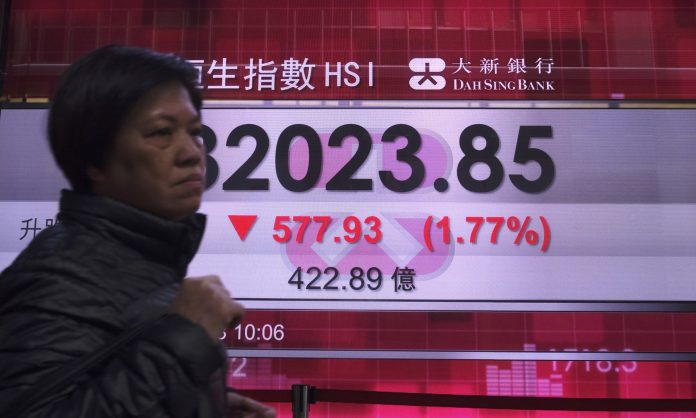Share markets in Asia have suffered their biggest selloff for more than a year as fears of rising inflation battered the bond market, toppled Wall Street from record highs and sparked speculation that central banks could raise interest rates.
Most major bourses across the Asia Pacific region fell in Monday trading as investors took fright at jobs figures from the US last week which showed wages growing at their fastest pace since 2009 and fuelling expectations that inflation was making a comeback after years of price stagnation.
Japan’s Nikkei sank 2.55% in its biggest fall since the day of Donald Trump’s election win, while Hong Kong was down more than 1%. In Australia the ASX200 index closed down 1.6%, or 95 points to 6,026, wiping a total of $33bn from the value of the market.
Futures trading indicated that the FTSE100 index would fall more ethan 1% at the open on Monday, or around 78 points. The markets also reacted by pricing in the risk of three, or even more, interest rate rises from the US Federal Reserve this year.
“It’s going to be a nervous start to the week for traders across all markets as they wonder if last week’s reversal in US stocks and the ugly close Friday … is likely the start of something bigger,” said Greg McKenna, chief market strategist at AxiTrader in Australia.
Australia’s Reserve Bank board meets on Tuesday to deliberate on interest rate policy. It is expected to keep borrowing costs on hold at 1.5% but the rise in bond yields increases the chances of the next move being upwards.
Yields on 10-year US treasury paper were up at a four-year peak of 2.86%, having jumped almost 7 basis points on Friday. Rising bond yields are an indicator that markets expect the cost of borrowing to rise.
Shares on Wall Street were already seen as expensive by many historical measures and sold off in reaction.
“It has to be remembered that US shares were priced for perfection at around 19 times earnings,” said Craig James, chief economist at Australian fund manager CommSec, noting the historic average is around 15 times.
“Still, US companies have produced stellar earnings over the reporting period. So it is understandable that some ’irrational exuberance’ would emerge.”
With half of the S&P 500 companies having reported, 78% have beaten expectations against an average 64%.
The lift in US yields provided some initial support to the dollar after a rocky start to the year, though it was starting to lose out again in Asian trade. Against a basket of currencies, the dollar was down a fraction at 89.154 having climbed 0.6% on Friday for its biggest single day gain in three months.
The dollar backed off to 109.95 yen from an early 110.29, while the euro was barely changed at $1.2457. The pound was up slightly at $1.412.
Any rally in the US dollar is considered a negative for commodities priced in the currency. Gold was off a touch at $1,330.47 an ounce after losing 1% on Friday. In oil markets, U.S. crude fell 66 cents to $64.79 a barrel, while Brent lost 71 cents to $67.87.
Source https://www.theguardian.com/business/2018/feb/05/asia-pacific-shares-pummelled-as-inflation-shadow-spooks-bonds























































